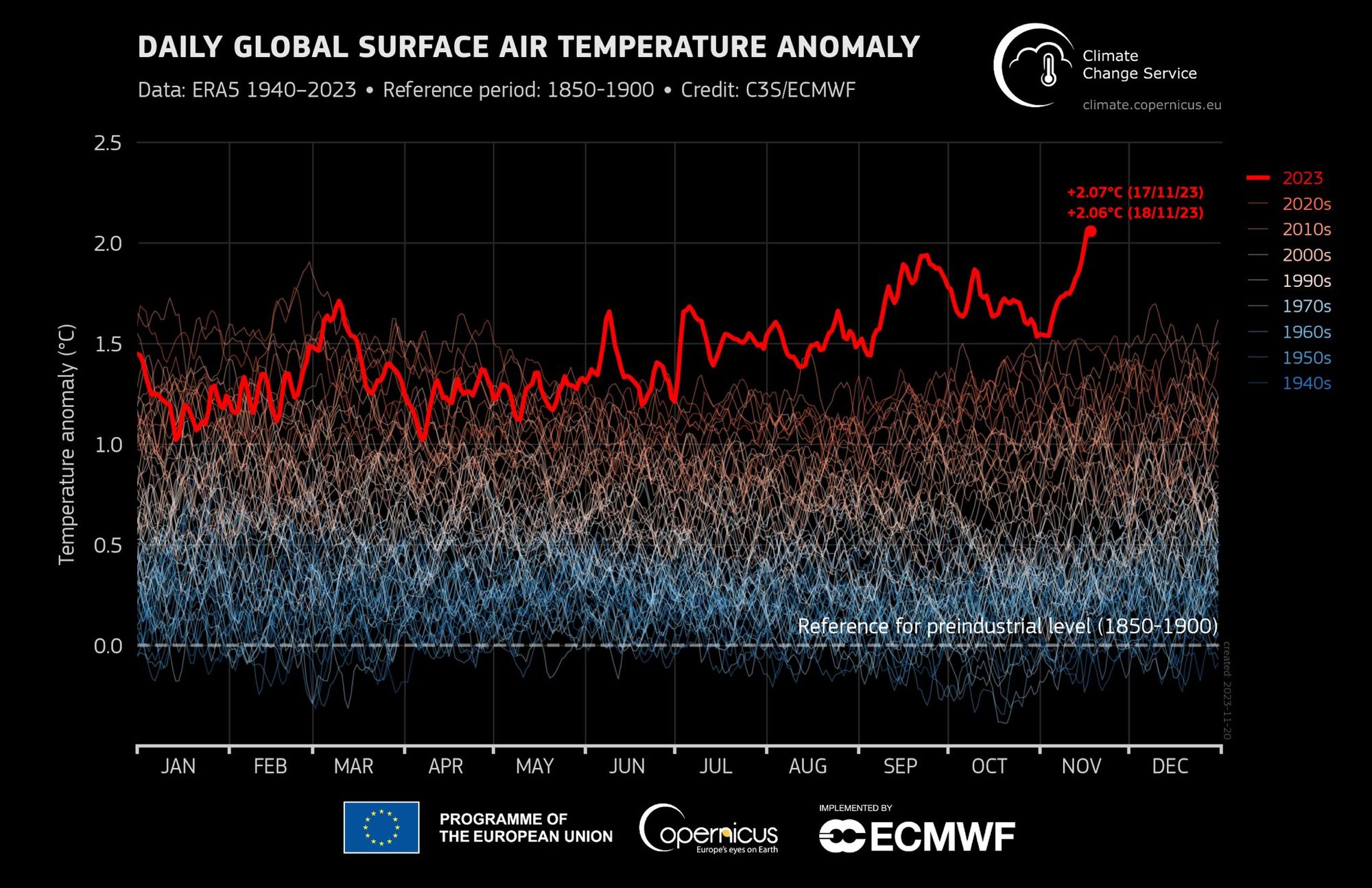The Third Layer of Fear: We're Already Living in a 2C World
We know what to expect.
Well, we did it. Pop the champagne.
After the hottest summer in recorded history, the planet continued its upward path. As of Nov 17, we've gone more than 2.0C degrees above the preindustrial baseline set by climate scientists. If you remember, 1.5C was supposed to be a critical threshold, a point of no return. At 2C, the planet begins to turn uninhabitable. Here's the data from the Copernicus Climate Change Service, so you know it's legit:

In a 2C world, "climate disasters will become so extreme that people will not be able to adapt... Heatwaves, famines and infectious diseases could claim millions of additional lives by century's end." That's according to a mild summary of a 2023 report from the UN's Intergovernmental Panel on Climate Change, known as the IPCC. They've been releasing reports for years, urging us to stop burning fossil fuels and to transition away from the economic systems that demand them.
Let's stop the handholding.
Shall we?
Heatwaves, famines, and pandemics will kill millions, by the end of this decade. They'll kill tens of millions. You can read the unvarnished truth in books like Hothouse Earth and Nomad Century.
We've already seen the beginning of crop failures, with outputs slashed by 20-30 percent over the last few years alone. Breadbasket states like Kansas had their worst wheat harvest "in 60 years or more." Countries like India have already started to ban rice exports amid shortfalls in production. The Food Policy Research Institute counts at least 41 export bans or restrictions across 19 countries, all of them worried about El Nino, wars, and climate change in general.
It's just the start.
We recently saw an especially vivid example of what collapse has in store for us, when a catastrophic heatwave in Brazil led to a thousand Taylor Swift fans fainting during her show and needing emergency medical attention for heat sickness. One of her fans, Ana Clara Benevides Machado, died.
Taylor Swift's heartbreak didn't last long, and she was back onstage a couple of days later, albeit this time with firefighters hosing off crowds to keep them from bringing the vibes down with their sickness and death. Taylor Swift herself has yet to utter a single substantive word about climate change or the consequences of flying around the world in private jets for a total of 166 hours, with a fleet of 50 big rig trucks hauling the gear for her elaborate setups. When called out, her publicist said she loans her jets to friends, so it's not her fault.
It's okay to use 50 big rig trucks on a world tour as long as you give them nice big bonuses. Here we see the exact problem with human nature. It's comparatively easy and makes you look incredibly generous to give out giant bonuses to your crew, and it helps deflect attention from the uncomfortable fact that the entire world that revolves around these concert tours is unsustainable, and it should stop immediately. You can't say that, though.
It sounds negative.
Taylor's two jets alone emit more than 8,000 tons of carbon a year, compared to the global average of 4 tons. Some folks did the math on Taylor's jet use and concluded, "You could live on this planet for 500+ years and not emit as much CO2 as Taylor Swift emits in 1 year." Those numbers don't even include the trucks, or the carbon emissions generated by her fans traveling to see her.
So even if you're not dropping dead at her concerts, Taylor Swift is still killing the planet you call home. This is what popular celebrities do. They work with publicists and consultants to craft an image that diffuses criticism and cons the public into believing that they either care, or they're just too innocent and naive to understand what they're doing.
In most cases, it's almost certainly false. They know.
Obviously, it's not just Swift.
The music industry emits 540,000 tons of greenhouse gases every year. That's the equivalent of 60,000 homes.
It's a lowball estimate.
Celebrities from Oprah to Steven Spielberg all carry carbon footprints hovering around 3-4,000 tons a year. Billionaires from Roman Abramovich to Jeff Bezos emit up to 22,000 tons of carbon each, just via their own personal lifestyle choices. Most of it comes from their yachts, which are hardly necessary for survival.
Look, I know. It's hard to get angry at Taylor Swift when Amazon emits 71 million tons of carbon every year.
That's the entire problem.
You can always point your finger at someone else who's doing more damage. You can always pull the Bill Gates move and insist "I am not part of the problem" if you can afford to pay a company to inject CO2 into a rock or capture carbon from the air to offset your emissions.
Hence, nobody ever takes responsibility.
The bottom line:
Despite all of this hand waving and finger pointing, emissions continue going up. The affluent and the super rich continue to harp on goals and deadlines that were rendered largely meaningless this year, as we broke through records so fast that climate scientists called it "gobsmackingly bananas."
Meanwhile, The Conversation recently found that even the most climate-anxious doomers won't alter their lifestyles to save the planet. As they state, "simply raising awareness and trying to nudge people into changing their behavior is unlikely to have the necessary impact" to bring down emissions, especially given the clamped timeline. "Without state intervention, we simply won't see any meaningful changes to business and industry practices, and lifestyles and consumption habits. We cannot keep using encouragement and hope."
That's unfortunate.
If you remember 2020, half the public lost their minds when you asked them to stay home for a few weeks. They pitched fits over their rights and freedoms, stormed statehouse buildings, and plotted to kidnap governors. Ever since then, the corporate media has worked alongside the CDC and other agencies to completely erase N95 masks and air purifiers from any discussion about public health. And those are easy.
So even as we call for state intervention, we know realistically how many politicians will oppose it, simply because they don't want to risk their political careers.
That leaves us here.
Back in September, minimizers were assuring us that the planet would start to cool down, and we would get "back to normal" as we entered the fall and winter months.
I guess they forgot about the southern hemisphere, typical egocentrism on their part. They haven't cared about the global south, ever.
We're living through an especially bad patch of climate disasters now caused by El Nino. Meteorologists expect it to peak in the spring of 2024. We've already lived through the most expensive disaster year in recorded history. Nobody knows what 2024 will bring our way. We also don't know for sure if El Nino will peak.
We don't really know anything. As we saw in Acapulco, we can't even predict hurricanes anymore.
We just know one thing:
This is it. We're here. You can get out now. The future we've been dreading has arrived. Ironically, it brings a sense of relief.
For many of us, a huge amount of stress came from anticipation, wondering what the future would look like, and secretly fearing we were wrong.
Psychologists have a term for that.
It's called anticipatory anxiety. Experts describe it as "a third layer of fear." In normal situations, it leads to the kind of dread that keeps you up at night. It drives panic attacks. It can lead to avoidance behaviors, where you stop living out of fear of future events.
Well, that part's over.
We've breached 2C decades earlier than expected. You can blame it on El Nino, but it hardly matters. These temperatures push us closer to and further beyond tipping points, and we've most likely already passed five of nine that include the loss of rainforests, northern forests, glaciers, ice sheets, permafrost, and coral reefs. We call them tipping points because if they go, then so goes the planet's ability to regulate its weather patterns. In short, yes, one bad El Nino could push us over into collapse.
So what's the takeaway?
There's no doubt left.
I know it sounds counterintuitive, but you can relax. Collapse is happening. You don't have to lose sleep over trying to "prevent" the collapse anymore.
You don't have to steep in pools of vague dread anymore, wondering what the future holds.
We're seeing it.
It's here.
We also know what humans are going to do. Pop stars and celebrities can keep performing out of some misplaced sense of obligation to their fans while they're rushed off to the hospital with heat stroke. They can die, and the show will go on. As a concession, and to manage public perception, they'll finally offer free water one time.
And neck fans.
There's a certain nobility in doing your best to try and not make things even worse. You can always go vegan or at least make a serious effort to eat less meat. You can limit travel to necessities. You can monitor your energy and water use. At this point, it's mostly a gesture.
I, for one, think it still matters not to be a total hypocrite about all this. I don't need to spend half my life savings to fly across the world for a look at the pyramids. I don't need to risk my life for a chance to see some celebrity who honestly doesn't care if I die. I don't need to stay up at night anymore.
If nothing else, we've crossed the third layer of fear. As collapse accelerates, people around you will probably start to show more signs of panic. It's going to manifest in strange ways, including astonishing amounts of denial and wishful thinking.
You might start to feel calm. There's nothing wrong with you. Your anticipatory anxiety is fading.
You can let it go.
A little.
OK Doomer offers an escape from wishful thinking. If you appreciate this work, consider subscribing or buying me a coffee. Paid memberships start at $9 a year. We need 900 subscribers to reach our goal by the end of the year. Thank you to all the readers who support this site.
It makes a difference.



